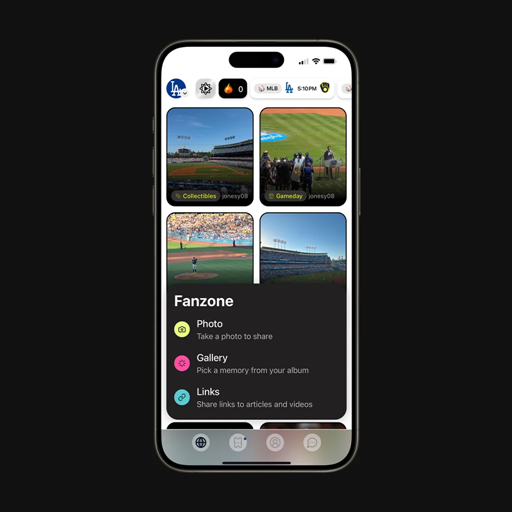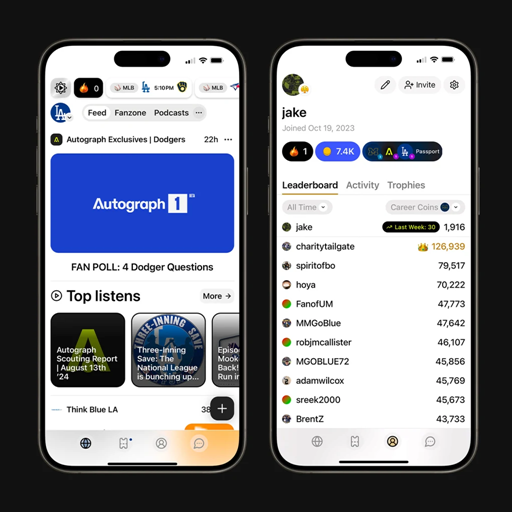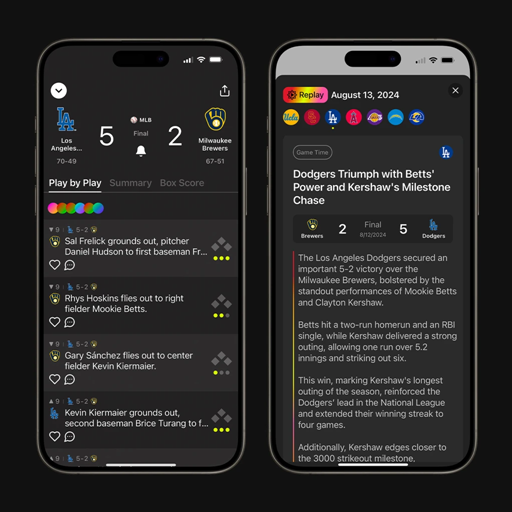Tom Brady’s $200 million NFT startup Autograph relaunches without NFTs
In an exclusive conversation with the Autograph team, we get inside the strategy of the newly redesigned app that’s less about collecting and more about media.
BY Mark Wilson
In 2021, Tom Brady cofounded one of the world’s hottest startups. Autograph was an NFT platform that, amongst other offerings, promised to digitize the real signatures of athletes like Simone Biles to burnish the value of virtual collectibles. The company raised more than $200 million alongside an advisory team that included a range of talents, from Apple SVP Eddie Cue to tennis star Naomi Osaka, and penned a multi-year deal to provide NFTs to ESPN.
And then, the NFT market crashed. Brady found himself mixed up in the fraudulent crypto startup FTX, for which he was an ambassador (In 2021, Autograph added the now-convicted FTX founder, Sam Bankman-Fried, to its board). Autograph, once employing more than 100 people according to LinkedIn, reportedly faced multiple waves of layoffs, and now operates with a team of around 30 including contractors, according to the company.
(While Autograph PR originally offered an interview with Brady for this article, they refused to pass along basic questions, ranging from his aspirations for the Autograph app and his ongoing involvement with the company, to his perceived viability of NFTs and crypto following the collapse of FTX.)
“We saw the entire NFT market shift,” says Autograph cofounder and CEO Dillon Rosenblatt. “I’m really proud of the work we did in chapter one of the business…[today] the mission is the same. Give fans a new way to engage and be rewarded for what they do.”

While Autograph’s initial hype cycle may have passed, the startup is moving on with the official relaunch and redesign of the Autograph app. Today, Autograph feels much less like a web 3.0 startup, and much more like a media company. In fact, the current iteration of the app doesn’t include NFTs or blockchain at all.
Billed as a one-stop-shop for sports fandom, Autograph asks you to subscribe to NFL, NCAA football, and NBA/MLB/NHL teams, and then it curates a feed of stories and podcasts tied to your team of choice. Basically, the feed creates a core reason to use Autograph aside from collecting. Then, as you read and listen, you’re awarded with coins and trophies for your engagement. Save up enough coins, and you can cash them to get access to enter special drops—anything from tickets to collectible merchandise—for which you’ll still need to spend real money to buy.
“Once you own a collectible, you own it . . . but what fans wanted was a more engaging experience,” says Rosenblatt of Autograph’s 1.0 release. “How do you keep the party going to have this always-on thing for fans?”

Introducing a new game loop
Nine months ago, Autograph began beta testing what became the new app with the University of Michigan football team (Brady’s alma mater). Autograph launched as a closed beta with “tens of thousands” of Michigan fans in attempts to prove out a new model for one team that could scale across sports.
Setting up this new model meant that Autograph had to develop relationships with about a dozen local content partners in the Michigan sports market—a relationship the company likens to that Uber has with its drivers (though most contributors are unpaid). Today, Autograph says it aggregates content from 3,800 sources ranging from blogs to YouTube channels.
“From a design perspective, we felt like there’s too much out there for people; they have to hop app to app,” says Joe Perez, the COO and CMO of Autograph. “How can we put everything together . . . for the design of consumption?”
Meanwhile, the app itself is mostly just a web wrapper for partner content creators. It frames media written or recorded elsewhere alongside the gamified elements like coins. Users get one coin for reading a tweet, and 30 coins for listening to a podcast—as the system tracks that you’ve read or listened to the entire piece of media. You can think of every sports team in Autograph almost like its own subreddit. While there are no comments or message boards, fans can see each other on a leaderboard of those consuming the most media on the app. And each fan can share their own “passport,” which is a snapshot of their activity and achievements on Autograph.
“The secret to this whole thing is that every community is a passionate atomic network,” says Perez. “We may not get a million users tomorrow, but we may not want a million users who may not pay or care about earning coins.”
Rather than relying upon advertising for the bulk of its revenue, the Autograph team is confident that by selling tickets and collectibles—and by “collectibles” I mean real, physical goods as opposed to NFTs—they can generate significant amounts of revenue.
“In the beta, we didn’t know if people would pay $5 or $10 for anything,” says Perez. “[Then] someone spent $550 on a signed football. Some tickets to the Rose Bowl went for about $1,000.”
Autograph didn’t quite charge full retail on these items because they want to reward fandom on the app, but Perez notes the actual cart prices were still high despite subsidization. To him this signifies Autograph has an audience interested in higher end spending. He imagines that e-commerce opportunities will only scale for Autograph, either in the form of limited edition drops (with goods supplied by Autograph-connected superstars like Tom Brady), or selling actual game tickets (tickets have an entire tab front and center in the Autograph app—and Autograph claims to have access to the same tickets you see on Stubhub but with lower fees).
“There’s a tight core game loop people go through,” says Rosenblatt, explaining how consuming media leads to collecting coins and ultimately buying stuff—even if a vast majority of event tickets are available without saving up some threshold of coins, much like a normal store. “We found in the beta that fans absolutely love tickets—which sounds obvious—but then we built into the loop.”

The future of fandom
In many ways, Autograph resembles an app that could have been released in 2010, stuffed with those early wave gamification elements like coins and trophies to drive engagement like a fitness app. In fact, the only obvious thing that couldn’t have existed in the app back in 2010 is its quiet integration of AI. A tool called Replay gives you a tl;dr breakdown on everything that happened to your team in the last day, using AI summarization to make it possible.
But from a pure strategy perspective, Autograph is betting that these gamified rewards (coins, tickets, and jerseys) are more appealing to many fans than the more amorphous social rewards that have taken over most of the internet (aka, the likes and shares we get across so much of social media). It might not be the worst bet to make, but with so much funding in-hand, Autograph still faces the incredible expectations of scale when companies ranging from Disney to Apple already work in sports news aggregation.
Meanwhile, Autograph teases that NFTs and blockchain could still be part of upcoming releases in the app. “We have the ability to turn it on,” notes Rosenblatt, who assures me the company is taking a user-centered approach to web 3.0 technology, as trophies will eventually be released as the first blockchain-based part of the new Autograph app (though not in time for this release). “Some fandom can be written to blockchain, but for the user, it’s the exact same experience.”
Yet if the end user can’t tell the difference anyway, one might wonder, should Autograph still be thinking about blockchain at all? Is it additive in any measurable way at all to the experience?
“As the tech progresses, having fan identity on-chain will be incredibly valuable for people,” Rosenblatt assures me. But for now? Autograph hopes its immediate potential is in supporting fan behaviors that are as old as time: offering the articles you already want to read, and tickets to games you already want to see.
ABOUT THE AUTHOR
Fast Company
(9)